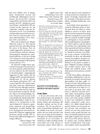 15 citations,
January 2020 in “Experimental Dermatology”
15 citations,
January 2020 in “Experimental Dermatology” The document concludes that understanding and treatments for alopecia areata have significantly advanced, now recognizing it as an autoimmune disorder.
13 citations,
April 2019 in “International journal of molecular sciences” Acyzol could help treat conditions caused by zinc deficiency.
 11 citations,
October 2021 in “Stem Cell Research & Therapy”
11 citations,
October 2021 in “Stem Cell Research & Therapy” Hair follicle stem cells reduced hair loss and inflammation in mice with a condition similar to human alopecia.
 9 citations,
January 2017 in “International Journal of Trichology”
9 citations,
January 2017 in “International Journal of Trichology” The study suggests that mast cells might be involved in the hair loss condition telogen effluvium and could be a target for treatment.
 8 citations,
July 2021 in “Patient Preference and Adherence”
8 citations,
July 2021 in “Patient Preference and Adherence” Alopecia treatments improve life quality but side effects can lessen this benefit; better use of quality of life measures is needed.
 8 citations,
March 2021 in “Medicine”
8 citations,
March 2021 in “Medicine” The revised Chinese Symptom Checklist-90 is more reliable and valid for psychological assessments.
 7 citations,
September 2023 in “Cancer Treatment Reviews”
7 citations,
September 2023 in “Cancer Treatment Reviews” Managing side effects of endocrine therapy is crucial to improve adherence and survival in breast cancer patients.
7 citations,
April 2021 in “Journal of Bodywork and Movement Therapies” Recognizing and managing central sensitization and stress is crucial for treating chronic pain.
 7 citations,
July 2019 in “International archives of internal medicine”
7 citations,
July 2019 in “International archives of internal medicine” Common skin conditions can greatly affect a person's mental health and social life.
 6 citations,
May 2022 in “Frontiers in Medicine”
6 citations,
May 2022 in “Frontiers in Medicine” The study suggests pandemic stress might worsen or trigger hair loss problems.
 4 citations,
June 2021 in “Journal of Microbiology and Biotechnology”
4 citations,
June 2021 in “Journal of Microbiology and Biotechnology” Ginsenoside Rg4 from ginseng may help hair growth by activating certain cell signals.
 2 citations,
December 2023 in “JEADV. Journal of the European Academy of Dermatology and Venereology/Journal of the European Academy of Dermatology and Venereology”
2 citations,
December 2023 in “JEADV. Journal of the European Academy of Dermatology and Venereology/Journal of the European Academy of Dermatology and Venereology” The document suggests a new way to categorize skin and mind disorders into two main groups to reduce confusion.
 1 citations,
May 2023 in “Frontiers in Endocrinology”
1 citations,
May 2023 in “Frontiers in Endocrinology” Autism's genetics are linked with early age of puberty and less hair loss, but not with hormone levels or polycystic ovary syndrome.

New treatments for hair loss should target eight main causes and use specific plant compounds and peptides for better results.

The study concludes that long COVID recovery involves time, various treatments, and a strong patient-provider relationship.
 November 2022 in “IntechOpen eBooks”
November 2022 in “IntechOpen eBooks” Hair loss can significantly impact a person's mental health, causing issues like anxiety and depression, and stress can trigger hair loss.
 April 2022 in “International Journal of Health Sciences (IJHS)”
April 2022 in “International Journal of Health Sciences (IJHS)” A holistic treatment approach, including yoga, diet, exercise, and mindfulness, can effectively manage PCOS symptoms.
 October 2020 in “Authorea (Authorea)”
October 2020 in “Authorea (Authorea)” Men and women react differently to opioids, with hormones potentially influencing these differences.
 3 citations,
May 2010 in “Nursing Standard”
3 citations,
May 2010 in “Nursing Standard” Treatments for autoimmune hair loss have limited success and often relapse, and emotional support is crucial for those affected.
 27 citations,
January 1990 in “Child Psychiatry & Human Development”
27 citations,
January 1990 in “Child Psychiatry & Human Development” The document concludes that supportive home environments and addressing parent-child interactions can effectively treat trichotillomania in children.
 1 citations,
May 2010 in “Nursing Standard”
1 citations,
May 2010 in “Nursing Standard” Treatments for autoimmune hair loss have limited success and patients need emotional support and self-acceptance.
 31 citations,
May 2012 in “European Journal of Dermatology”
31 citations,
May 2012 in “European Journal of Dermatology” Menopause affects hair and skin; more research needed for treatment.
 46 citations,
August 2019 in “Journal of the European Academy of Dermatology and Venereology”
46 citations,
August 2019 in “Journal of the European Academy of Dermatology and Venereology” People with hair loss conditions experience more anxiety, depression, and a lower quality of life than those without these conditions.
 9 citations,
January 2015 in “Skin appendage disorders”
9 citations,
January 2015 in “Skin appendage disorders” The article suggests that the belief in common postpartum hair loss lacks sufficient evidence and may be overestimated.
 3 citations,
April 2002 in “The American Journal of Medicine”
3 citations,
April 2002 in “The American Journal of Medicine” The document concludes that early diagnosis of Balint's syndrome is crucial for effective treatment and that understanding drug interactions, like between ritonavir and statins, is important for patient care.
 November 2023 in “International journal of biology, pharmacy and allied sciences”
November 2023 in “International journal of biology, pharmacy and allied sciences” Herbal treatments can help with hair problems, but more research is needed.
 April 2017 in “InTech eBooks”
April 2017 in “InTech eBooks” Many people with hair loss experience scalp pain known as trichodynia, but the causes are unclear and treatments vary.
 3 citations,
April 2011 in “Expert Review of Dermatology”
3 citations,
April 2011 in “Expert Review of Dermatology” Mesotherapy lacks strong evidence for effectiveness and safety, and its ingredients are not FDA-approved for subcutaneous use.
4 citations,
September 2023 in “Nutrients” Managing diabetes can lead to eating disorders, and eating disorders can make diabetes harder to control.
 66 citations,
July 2007 in “Journal of Molecular Medicine”
66 citations,
July 2007 in “Journal of Molecular Medicine” Stress increases certain chemicals in the skin and nerves, which might worsen skin conditions.



























